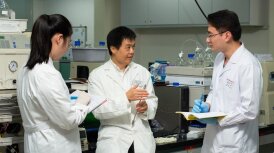
Dispelling misinformation and anxiety

The enhanced prevention measures during the fifth wave of the COVID-19 outbreak in Hong Kong have drastically changed citizens' daily lives. In these challenging times, scholars at HKBU have conducted a series of research studies to identify and address issues that can help decision-makers develop and refine public health communication strategies.
Getting the right information
Exposure to misinformation about COVID-19 vaccines can reduce the public's intention to get vaccinated, and therefore it is crucial for the public sector to debunk the misinformation in a timely and effective way while also providing clear and feasible guidance as well as calls for action.
In a recent study, Dr Zhang Xinzhi, Assistant Professor of the Department of Journalism, and his team examined the frequency and nature of the delivery channels used to share COVID-19 vaccine misinformation messages in Hong Kong from July 2021 to February 2022, and they reviewed the rumour-clarification and debunking practices of the public sector. The team found that the debunking posts mostly focused on the negative aspects, such as the side effects of the vaccines and the stigma associated with the vaccination process, while positive content mentioning the potential benefits of vaccination was relatively less frequent.
Based on the analysis, the researchers suggest that there should be more focused messages for the respective target audiences, more calls for action, and posts on self-efficacy that can promote vaccination and help people make informed choices. Debunking posts should also be more coherent and supported by relevant figures and evidence.
For the details of the study, please click here.
Using machine learning to analyse citizens' anxiety
With mental health organisations reporting an increased number of calls for help, it is imperative to understand the issues that Hong Kong people are most concerned about, in order to explore solutions that can help people maintain their mental wellbeing.
Led by Dr Li Yupeng, Assistant Professor of the Department of Journalism, an HKBU research team analysed the sentiments and the levels of anxiety in posts from a social media platform. By using natural language processing and deep learning techniques to capture and interpret the data, the team found that netizens showed an escalated level of anxiety that corresponded to the rapid deterioration of the epidemic situation from early February 2022 onwards. The project also discovered that the most frequently discussed issues on the social media platform are related to politics, health and the epidemic situation.
The findings suggest that the Government, in addition to focusing on public health issues, should also provide timely guidance and assistance to help relieve the anxiety of citizens. For example, releasing information about the latest policies which address specific problems may help reduce citizens' anxiety caused by uncertainty.
For the details of the study, please click here.
How to boost the vaccination rate among older people
Dr Stephanie Tsang, Assistant Professor of the Department of Communication Studies, conducted a survey to understand the reasons for the low vaccination rate among the elderly in Hong Kong. The study was designed to gather information on respondents' perceptions of the pandemic and attitudes towards the Government's anti-pandemic measures. It found that the respondents' vaccine hesitancy and risk perceptions of the COVID-19 vaccines have a significant impact on their parents’ vaccination status. The more the respondents thought that the vaccines were developed too quickly and that the advice given by infectious disease experts was inconsistent, the greater the tendency of their parents to delay getting vaccinated.
The findings suggest that healthcare experts should emphasise the safety of the vaccines when explaining the importance of vaccination to the family members of older people, and this should ease their concerns about the severity of the vaccines' side effects. Besides providing information about the vaccines' importance and how they work, it would be helpful to increase citizens' understanding of how the vaccines can be developed in a short period of time and why epidemic prevention experts may have different opinions.
For the details of the study, please click here.
Previous News



